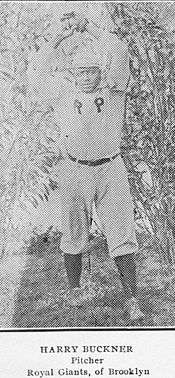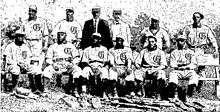Harry Buckner
| Harry Buckner | |||
|---|---|---|---|
 | |||
| Pitcher/Outfielder | |||
|
Born: October 22, 1876 Hopkinsville, Kentucky | |||
| Died: March 26, 1938 (aged 61) | |||
| |||
| debut | |||
| 1896, for the Chicago Unions | |||
| Last appearance | |||
| 1918, for the Chicago Giants | |||
| Teams | |||
| |||
Harry Edward "Green River" Buckner (October 22, 1876 – March 26, 1938) was an American baseball pitcher and outfielder in the Negro Leagues. He played from 1896 to 1918 with several teams.[6] He had several nicknames, including "Buck," Green River," and even "Goat Head."
Buckner was playing with the Chicago Unions in 1896 at the age of 23. He moved on to the Chicago Columbia Giants for a couple seasons, then the Philadelphia Giants in 1903.

In 1904, Buckner joined the Cuban X-Giants, and found himself playing in Cuba during the winter seasons for about four seasons. He played for several teams in his 1930s and 1940s, including the Brooklyn Royal Giants, Lincoln Giants, and Paterson Smart Set.
Sportswriter Harry Daniels named Buckner to his 1909 "All American Team." [7]
References
- 1 2 "Frank Lelands' Chicago Giants Base Ball Club" Fraternal Printing Company, 1910
- ↑ "Giants Were Twice Defeated" The Patriot, Harrisburg, Pennsylvania, Friday, September 11, 1903, Page 7, Columns 1 and 2
- ↑ "Big Colored Teams at Hoboken" New York Times, New York, NY, Saturday, July 20, 1907, Page 8, Column 2
- ↑ "Colored Brethren Can Wallop a Few" The Post-Standard, Syracuse, NY, Tuesday Morning, May 3, 1910, Page 10, Columns 2 and 3
- ↑ "Mohawks Play A.B.C.'s" Indianapolis Star, Indianapolis, IN, Sunday, July 12, 1914, Page 3, Column 7
- ↑ Riley, James A. (1994). The Biographical Encyclopedia of the Negro Baseball Leagues. New York: Carroll & Graf. ISBN 0-7867-0959-6.
- ↑ "The Base Ball Spirit In The East." Indianapolis Freeman, Indianapolis, Indiana, Saturday, December 25, 1909, Page 7, Columns 1 and 2
External links
- Negro league baseball statistics and player information from Seamheads.com, or Baseball-Reference (Negro leagues)
- Negro League Baseball Museum